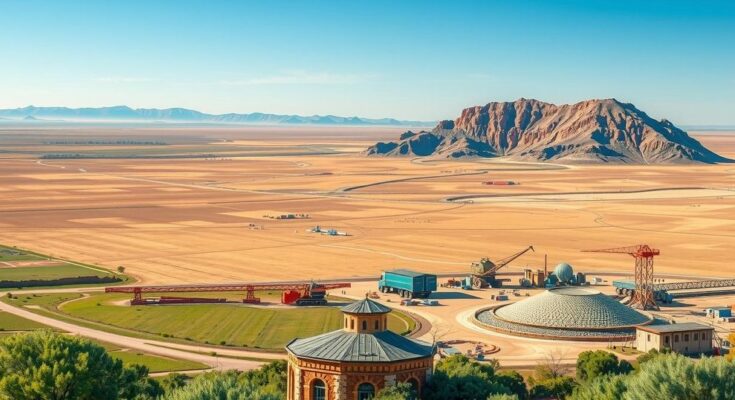France’s Orano Mining is collaborating with Uzbekistan’s Navoiuran and Japan’s ITOCHU to develop the Jongeldy uranium deposit, enhancing Uzbekistan’s position as a top uranium producer. The project, involving a $214 million investment, aims to streamline operations and boost production. This strategic shift follows Orano’s loss of uranium assets in Niger, emphasizing Uzbekistan as a vital partner for future uranium endeavors.
Orano Mining of France has redirected its focus toward Uzbekistan following the loss of its uranium assets in Niger. On March 10, 2025, Orano, Uzbekistan’s Navoiuran, and Japan’s ITOCHU entered into a trilateral agreement to initiate uranium extraction at the Jongeldy deposit. This agreement aims not only to develop the deposit but also to promote geological exploration in other joint ventures, signaling a significant advancement for Uzbekistan’s uranium industry.
Uzbekistan is amongst the top five uranium producers globally, and collaborations with prominent international entities such as Orano and ITOCHU are expected to enhance the nation’s stature in this essential sector. The agreement paves the way for increasing production, expanding the uranium mining market, and drawing foreign investments, thus bolstering Uzbekistan’s economic landscape.
The first phase of the Jongeldy project will involve a US$214 million investment over three years, mainly contributed by foreign investors, with Navoiuran acting as the project operator. This strategy is designed to optimize production costs and link mining activities with existing industrial frameworks, targeting an average uranium yield of 500 tonnes annually, peaking at 700 tonnes in South Jongeldy.
To facilitate project execution, a joint venture named Nurlikum Mining will be formed, allowing ITOCHU to acquire a share. This joint effort underscores the global character of the initiative, thereby enhancing its attractiveness to investors. Orano’s move toward Uzbekistan follows its diminished presence in Niger, especially after comments from Niger’s Minister of Mines indicating that French firms may not regain mining rights there.
The World Nuclear Association reported that Niger was the seventh-largest producer of natural uranium in 2022, contributing 3.47% to the global output. Orano sourced about 1,200 tonnes from Niger, but the loss has positioned Central Asian projects, particularly in Uzbekistan, as crucial for the company’s future. Orano aims to increase project engagements in countries such as Kazakhstan, Mongolia, Namibia, and Canada.
The Jongeldy deposit development builds upon earlier cooperation frameworks established in 2022 between Navoiuran and Orano, which was reaffirmed during meetings between Uzbekistan President Shavkat Mirziyoyev and Orano officials. Recently, on December 2024, Orano also initiated discussions with Mongolia on the Zoovch-Ovoo deposit.
The trilateral agreement signifies a pivotal development in Uzbekistan’s uranium sector, promising to enhance production and solidify the nation’s position in the global market. In light of recent geopolitical transitions and Orano’s reevaluation of its African investments, Uzbekistan has emerged as an essential partner. The arrangement not only offers Japan stable uranium supplies but also suggests further collaboration and investment growth in Uzbekistan’s uranium industry.
The recent trilateral agreement involving Orano Mining, Navoiuran, and ITOCHU represents a significant step forward for Uzbekistan’s uranium sector. This collaboration is poised to enhance uranium production, attract foreign investment, and strengthen Uzbekistan’s global standing in the uranium market. Following the loss of its assets in Niger, Orano’s strategic shift toward Uzbekistan reflects changing geopolitical landscapes and presents a future of expanded cooperation and investment opportunities in the region.
Original Source: news.az




